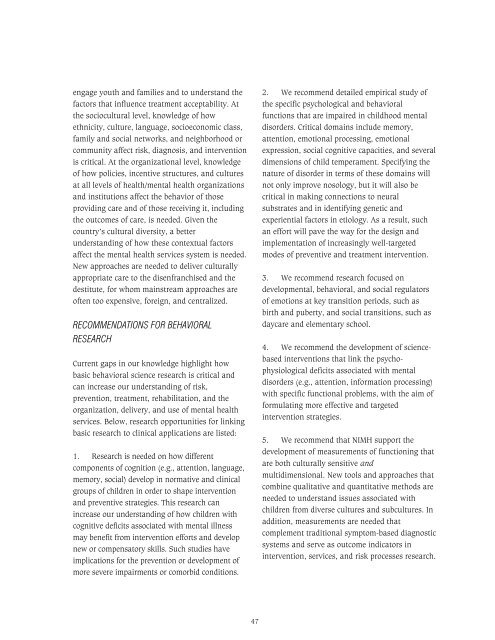Research on Child and Adolescent Mental Health
Research on Child and Adolescent Mental Health
Research on Child and Adolescent Mental Health
You also want an ePaper? Increase the reach of your titles
YUMPU automatically turns print PDFs into web optimized ePapers that Google loves.
engage youth <strong>and</strong> families <strong>and</strong> to underst<strong>and</strong> the<br />
factors that influence treatment acceptability. At<br />
the sociocultural level, knowledge of how<br />
ethnicity, culture, language, socioec<strong>on</strong>omic class,<br />
family <strong>and</strong> social networks, <strong>and</strong> neighborhood or<br />
community affect risk, diagnosis, <strong>and</strong> interventi<strong>on</strong><br />
is critical. At the organizati<strong>on</strong>al level, knowledge<br />
of how policies, incentive structures, <strong>and</strong> cultures<br />
at all levels of health/mental health organizati<strong>on</strong>s<br />
<strong>and</strong> instituti<strong>on</strong>s affect the behavior of those<br />
providing care <strong>and</strong> of those receiving it, including<br />
the outcomes of care, is needed. Given the<br />
country’s cultural diversity, a better<br />
underst<strong>and</strong>ing of how these c<strong>on</strong>textual factors<br />
affect the mental health services system is needed.<br />
New approaches are needed to deliver culturally<br />
appropriate care to the disenfranchised <strong>and</strong> the<br />
destitute, for whom mainstream approaches are<br />
often too expensive, foreign, <strong>and</strong> centralized.<br />
RECOMMENDATIONS FOR BEHAVIORAL<br />
RESEARCH<br />
Current gaps in our knowledge highlight how<br />
basic behavioral science research is critical <strong>and</strong><br />
can increase our underst<strong>and</strong>ing of risk,<br />
preventi<strong>on</strong>, treatment, rehabilitati<strong>on</strong>, <strong>and</strong> the<br />
organizati<strong>on</strong>, delivery, <strong>and</strong> use of mental health<br />
services. Below, research opportunities for linking<br />
basic research to clinical applicati<strong>on</strong>s are listed:<br />
1. <str<strong>on</strong>g>Research</str<strong>on</strong>g> is needed <strong>on</strong> how different<br />
comp<strong>on</strong>ents of cogniti<strong>on</strong> (e.g., attenti<strong>on</strong>, language,<br />
memory, social) develop in normative <strong>and</strong> clinical<br />
groups of children in order to shape interventi<strong>on</strong><br />
<strong>and</strong> preventive strategies. This research can<br />
increase our underst<strong>and</strong>ing of how children with<br />
cognitive deficits associated with mental illness<br />
may benefit from interventi<strong>on</strong> efforts <strong>and</strong> develop<br />
new or compensatory skills. Such studies have<br />
implicati<strong>on</strong>s for the preventi<strong>on</strong> or development of<br />
more severe impairments or comorbid c<strong>on</strong>diti<strong>on</strong>s.<br />
2. We recommend detailed empirical study of<br />
the specific psychological <strong>and</strong> behavioral<br />
functi<strong>on</strong>s that are impaired in childhood mental<br />
disorders. Critical domains include memory,<br />
attenti<strong>on</strong>, emoti<strong>on</strong>al processing, emoti<strong>on</strong>al<br />
expressi<strong>on</strong>, social cognitive capacities, <strong>and</strong> several<br />
dimensi<strong>on</strong>s of child temperament. Specifying the<br />
nature of disorder in terms of these domains will<br />
not <strong>on</strong>ly improve nosology, but it will also be<br />
critical in making c<strong>on</strong>necti<strong>on</strong>s to neural<br />
substrates <strong>and</strong> in identifying genetic <strong>and</strong><br />
experiential factors in etiology. As a result, such<br />
an effort will pave the way for the design <strong>and</strong><br />
implementati<strong>on</strong> of increasingly well-targeted<br />
modes of preventive <strong>and</strong> treatment interventi<strong>on</strong>.<br />
3. We recommend research focused <strong>on</strong><br />
developmental, behavioral, <strong>and</strong> social regulators<br />
of emoti<strong>on</strong>s at key transiti<strong>on</strong> periods, such as<br />
birth <strong>and</strong> puberty, <strong>and</strong> social transiti<strong>on</strong>s, such as<br />
daycare <strong>and</strong> elementary school.<br />
4. We recommend the development of sciencebased<br />
interventi<strong>on</strong>s that link the psychophysiological<br />
deficits associated with mental<br />
disorders (e.g., attenti<strong>on</strong>, informati<strong>on</strong> processing)<br />
with specific functi<strong>on</strong>al problems, with the aim of<br />
formulating more effective <strong>and</strong> targeted<br />
interventi<strong>on</strong> strategies.<br />
5. We recommend that NIMH support the<br />
development of measurements of functi<strong>on</strong>ing that<br />
are both culturally sensitive <strong>and</strong><br />
multidimensi<strong>on</strong>al. New tools <strong>and</strong> approaches that<br />
combine qualitative <strong>and</strong> quantitative methods are<br />
needed to underst<strong>and</strong> issues associated with<br />
children from diverse cultures <strong>and</strong> subcultures. In<br />
additi<strong>on</strong>, measurements are needed that<br />
complement traditi<strong>on</strong>al symptom-based diagnostic<br />
systems <strong>and</strong> serve as outcome indicators in<br />
interventi<strong>on</strong>, services, <strong>and</strong> risk processes research.<br />
47

















